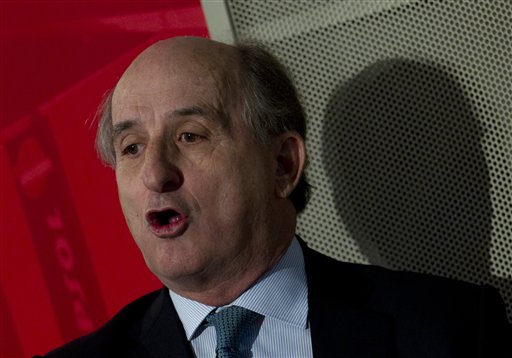By ALAN CLENDENNING
AP Business Writer
MADRID
Argentina’s President Cristina Fernandez is attempting to quell increasing unrest at home and boost her popularity with an “unlawful” bid to nationalize YPF, the Argentine oil unit of Spanish energy firm Repsol, the company’s president claimed Tuesday as the group’s shares plunged more than 7 percent.
As Spain’s government prepared retaliatory measures against Argentina, the European Commission added to the two nations’ rapidly rising economic and diplomatic tensions by indefinitely postponing a meeting with Argentine officials over a bilateral trade and economic treaty between the European Union and Argentina.
European Commission President Jose Manuel Barroso said he was “seriously disappointed” by Argentina’s decision and warned that “this creates an uncertainty which is not helpful to our economic relations and to the economy as a whole.”
Fernandez sparked the firestorm between Spain and Argentina on Monday when she sent a bill to her country’s congress to put a majority stake of YPF in state hands, effectively nationalizing the oil company. Argentina has in the past accused Repsol of failing to invest enough in YPF and its oil sector.
Repsol president Antonio Brufau told reporters that the company demands just compensation and will fight Fernandez’ plan, adding that she “carried out an unlawful act and made unlawful charges after a campaign aimed at knocking down YPF shares and allowing expropriation at a bargain price.”
YPF, he added, was singled out while other foreign energy companies with Argentina operations were not targeted.
The decision by Fernandez “is only a way of covering up the social and economic crisis Argentina is facing” amid high inflation and energy prices, Brufau added.
Repsol shares were down 7.1 percent to (EURO)16.25 ($21.34) each in early afternoon trading in Madrid, far underperforming the benchmark Ibex index, which was up 1 percent. Analysts were concerned that Argentina has not stated any compensation terms for the nationalization of YPF, which has 42 percent of Repsol’s global reserves, estimated at 2.1 billion barrels of crude.
Brufau told reporters that YPF is worth $18.3 billion, and he valued Repsol’s 57 percent stake in the unit at $10.5 billion. Argentina wants to take over Repsol shares representing 51 percent of YPF, meaning Repsol would be left with 6 percent and shareholders including a rich Argentine family would not be affected.
In a sign of the rising tensions between Spain and Argentina over the nationalization plan, the Spanish foreign ministry summoned Argentina’s ambassador to Madrid for the second time in five days to mount another formal protest.
Justice Minister Alberto Ruiz Gallardon said Argentina’s plan to nationalize YPF “represents an extraordinary political error in the medium and long term.”
Gallardon and other officials suggested Spain would retaliate, but did not say how. Energy Minister Jose Manuel Soria said the government could take action within days and cited possible lines of diplomatic or commercial retaliation against Argentina but did not provide specifics.
YPF is Argentina’s largest company and vital for its energy future, especially after a recent find of huge unconventional oil and natural gas reserves _ a discovery that Brufau stressed came from his company’s exploration efforts.
But the company has been under intense pressure from Fernandez’ government to raise output while its shares have plunged in recent months on fears of possible state intervention.
Argentina this year expects to import more than $10 billion worth of gas and natural liquid gas to address an energy crisis even though it is an oil-producing nation, according to estimates from the hydrocarbon sector.
Spain’s government is seeking to line up allies to contest the nationalization and possibly isolate Argentina economically. Prime Minister Mariano Rajoy is expected to try to drum up support this week during a trip to Mexico and Colombia.
Brufau encouraged shareholders to take part in the upcoming legal battle, and accused Fernandez of being “an expert manipulator” in her accusations that Repsol underfunded its YPF unit. He said Repsol has invested $20 billion in Argentina since it bought its stake in YPF in 1999.
As Fernandez was announcing the takeover on national television, Argentine authorities went to YPF headquarters in Buenos Aires and expelled Spanish executives, Brufau said.
Their “behavior with our managers and employees was pathetic and embarrassing,” he said.
Bilateral accords between Spain and Argentina will allow Repsol to take its case to the United Nations and the World Bank after Argentine lawmakers allied with Fernandez approve the plan, as is expected.
Spain is the largest foreign investor in Argentina, ahead of the United States. Spanish bank and telecommunications companies have a heavy presence in Argentina, where they have earned strong profits to offset deep losses in recent years at home due to the financial crisis.
Spain’s Telefonica SA operates six companies in Argentina, where it is the leading telecom provider, with revenue last year of (EURO)3.17 billion, up from (EURO)3 billion in 2010, according to its annual report.
The YPF nationalization has made the business climate in Argentina more uncertain for foreign companies, but experts doubted Fernandez would announce nationalizations affecting others.
___
Associated Press writers Jorge Sainz and Ciaran Giles contributed from Madrid; Barry Hatton contributed from Lisbon, Portugal; and Gabriele Steinhauser contributed from Brussels.

COMMENTS
Please let us know if you're having issues with commenting.